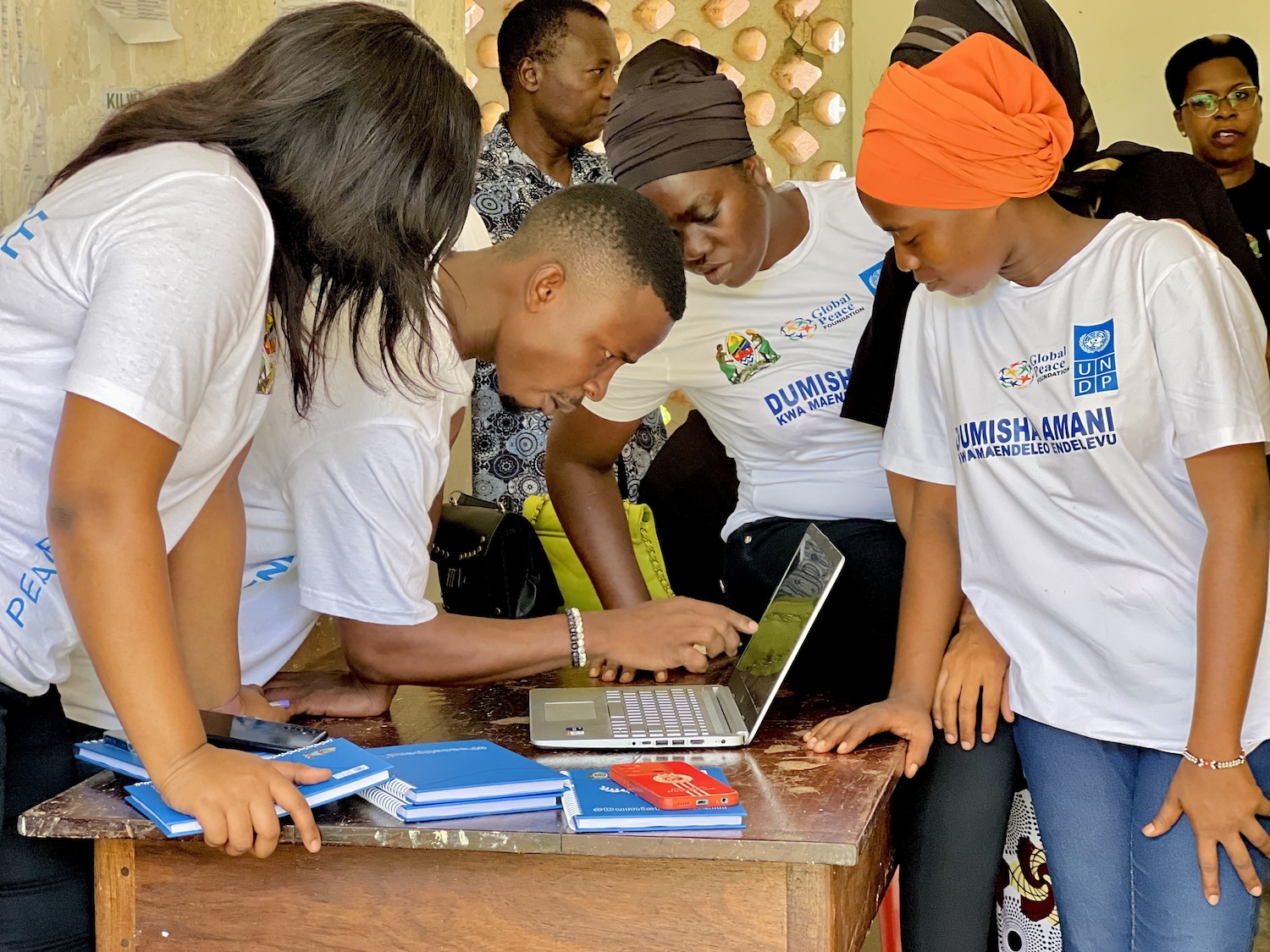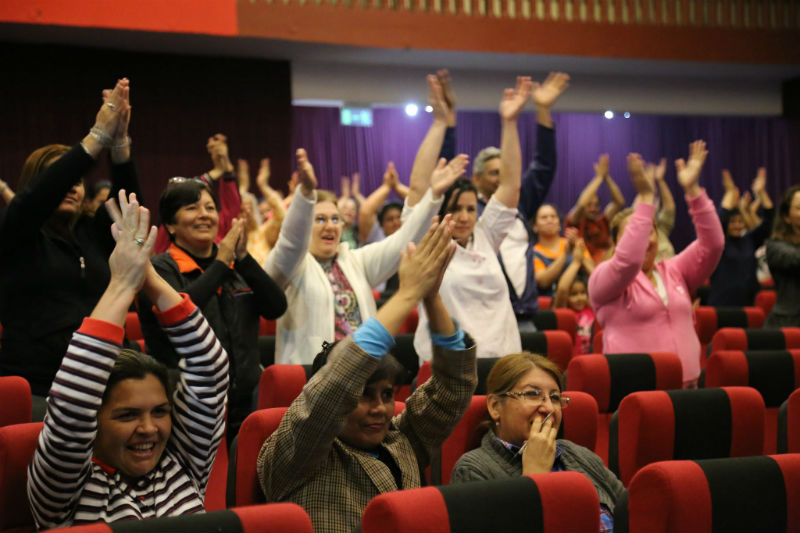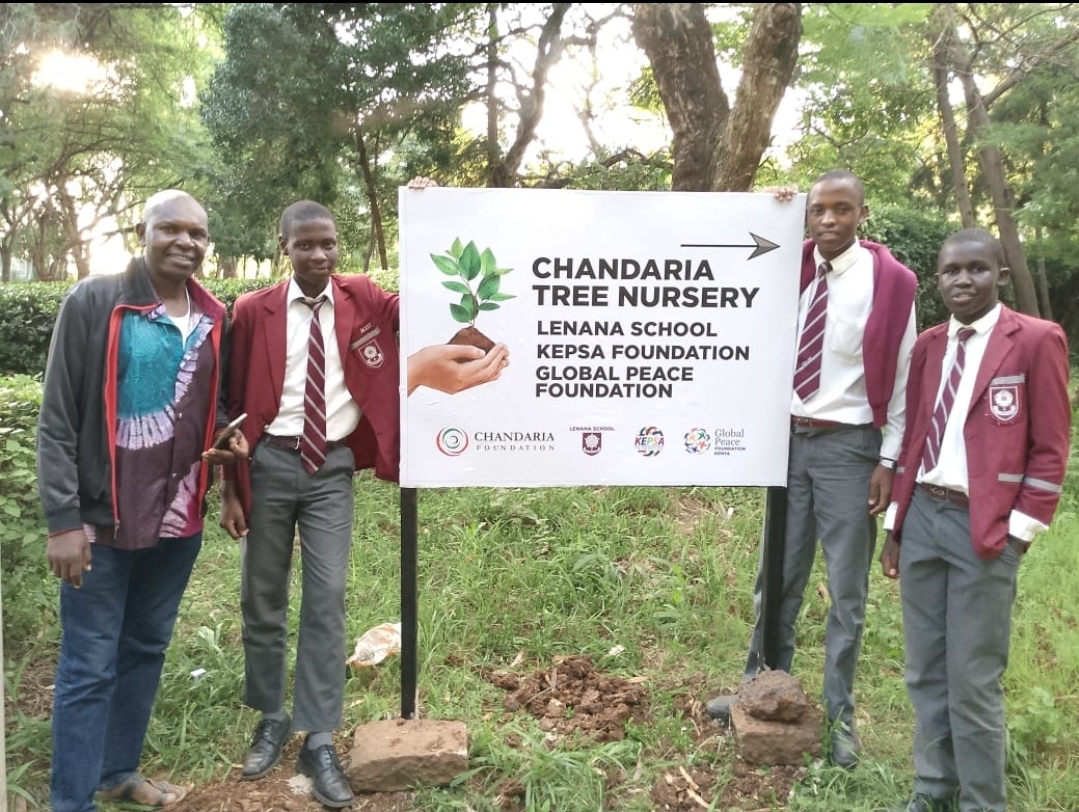North Korea’s appalling record of human rights abuses were exposed in grim detail by defectors and human rights advocates during a two-day International Forum on One Korea in Seoul on August 13-15. The conscience-shocking, generations-long history of torture, political and religious persecution, and arbitrary imprisonment in modern-day concentration camps exceed the worst violations of Nazi, Soviet, and communist Chinese regimes according to panelists, and continues into the present day.
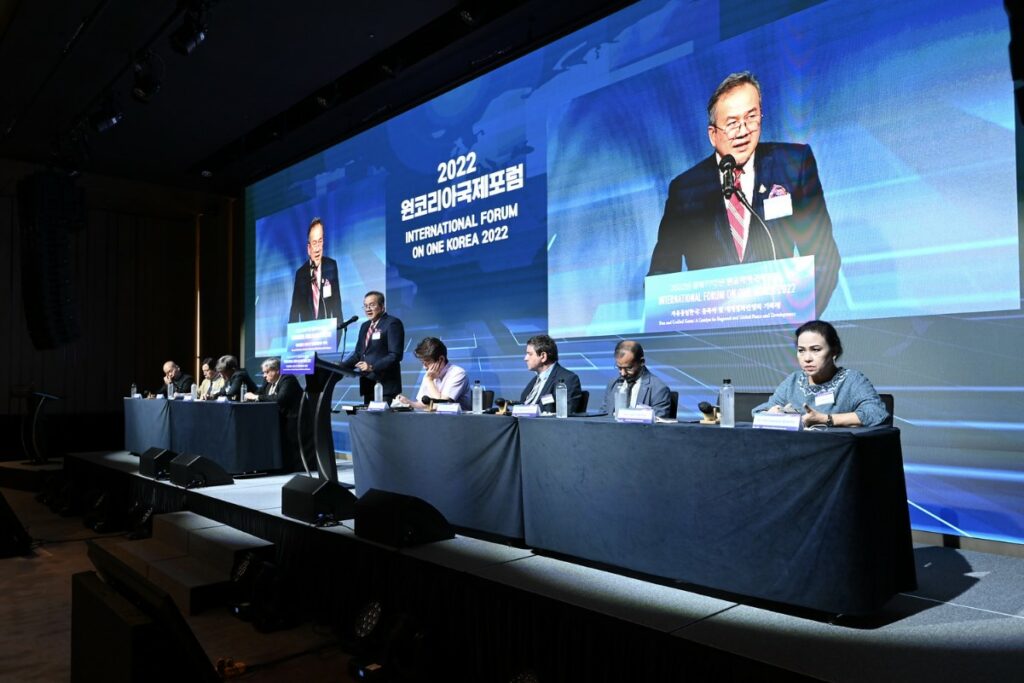
Panelists at the Peace and Security session during the two-day International Forum on One Korea in Seoul.
The forum also convened sessions on Economy and Peace and Security to underscore the potential for economic growth, resolution of the nuclear threat, and regional peace that could be achieved through Korean reunification.
The International Forum on One Korea is the latest in an ongoing series of forums organized by the Global Peace Foundation over the last decade to advance global support for a free and united Korea to resolve the security and human rights issues on the divided peninsula.
Kwang-joo Sohn, the former chairman of the Korea Hana Foundation and expert on North Korean human rights abuses, said the most fundamental aspect of the hereditary autocracy leadership structure in North Korea is the 10 Principles for the Establishment of a Monolithic Ideological System, which amounted to “the deification, absolutization and unconditionality of the Leader Kim Il-Sung.”
[caption id="attachment_987492105" align="alignright" width="350"]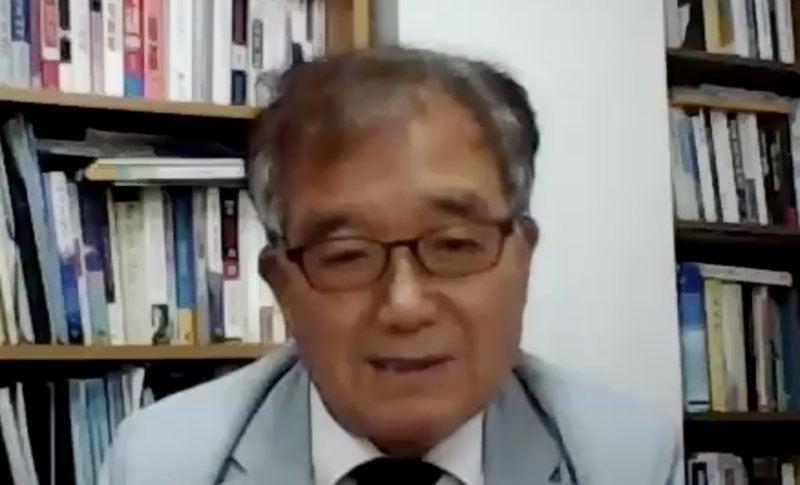 Kwang-joo Sohn, an expert on North Korean human rights abuses.
Kwang-joo Sohn, an expert on North Korean human rights abuses.Kwang-joo Sohn, an expert on North Korean human rights abuses.[/caption]The 10 principles, he said, hold “extra-constitutional status, meaning every party member and every North Korean citizen has to recite and live by the principles from the day they are born until the day they die.” Among the principles, citizens are to “unconditionally accept, treat as a non-negotiable condition, and decide everything based upon our Great Leader Comrade Kim Il Sung’s instructions and in every act think only about the greatness of our Leader.”
Such directives Mr. Sohn said, “were not present in Stalin’s leadership theory for Soviet Russia, nor for China in the Cultural Revolution era. The 10 Principles are the worst and most autocratic principles in history. Currently, of the estimated 100,000-150,000 North Koreans who are in political prison camps, 70-80 percent of them are there for violating the 10 Principles.”
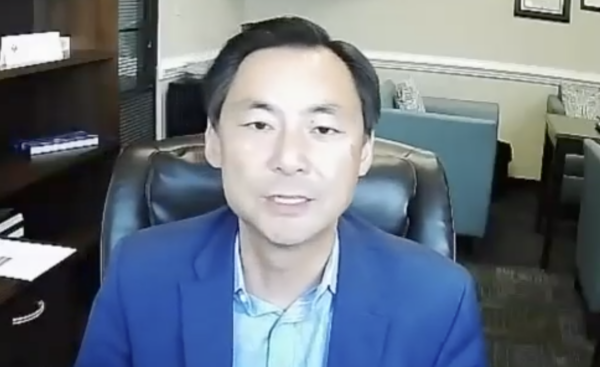
Dr. Morse Tan, former Ambassador-at-Large for Global Criminal Justice at the U.S. Department of State.
Dr. Morse Tan, former Ambassador-at-Large for Global Criminal Justice at the U.S. Department of State, said active concentration camps in North Korea are like those of the Stalinist gulags in the Soviet Union or the camps in China or the Nazi concentration camps in World War II, only worse. “And you might ask, ‘how could I say worse’? One of the things that was not a feature of those other concentration camps in North Korea is you have three generations that are punished. Some are born and live out their lives there for no other reason than a grandparent having run afoul of the Kim regime. And so, this is a feature of the North Korean regime that should shock the consciences of everyone in the world.”
Other panelists denounced North Korea’s practice of slavery, human trafficking, systemic rape and sexual slavery, and deployment of child soldiers.
“The 10 Principles for the Establishment of a Monolithic Ideological System, which amounted to the deification of the Leader Kim Il-Sung, were not present in Stalin’s leadership theory for Soviet Russia, nor for China in the Cultural Revolution and are the worst and most autocratic principles in history.”
North Korea’s “Juche Ideology is the conversion of the dictatorial ruling ideology into the form of Christian doctrine,” said Dr. Jin Shin, professor and director of the National Strategy Institute at Chungnam National University. “It is the only ideology allowed by North Korean authorities and the spiritual value system indoctrinated to North Korean people. This is why Juche Ideology is considered a type of religion.”
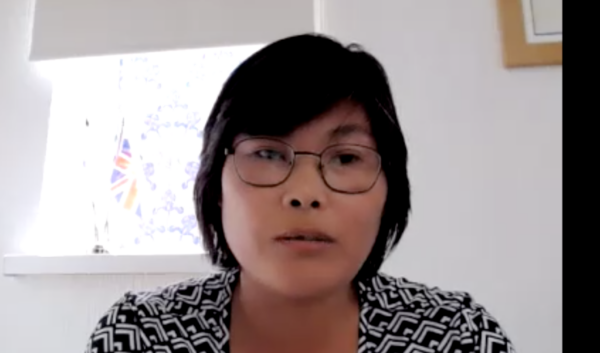
Ji-hyun Park, a North Korean refugee and Human Rights advocate.
Suggesting a way forward, Ji-hyun Park, a North Korean refugee and Human Rights Research Manager at Slavefreetrade in the United Kingdom, said, “Those who have hopes of freedom and to live their dreams say that the collapse of North Korea should be focused and changed through internal forces rather than external forces.
“Information bombing, civil-psychological warfare, sending Korean-language newspapers and dramas to Pyongyang, and especially sending the right information, should give the North Koreans a basic point in informing on the lies of the Kim’s family on the devastating brainwashing education.”
Peace and security
Scholars and government ministers from South Korea, China, Russia, Japan, the United States, Philippines, Sweden, Malaysia, and Indonesia assessed the complications to a peace regime on the Korea peninsula arising from Russia’s invasion of Ukraine and growing tensions between the U.S. and China during an August 13 forum.
“The military conflict between Russia and Ukraine, unfolding as a proxy war in Europe between Russia, United States and its allies, has dramatically changed the context for the international security debate,” Stimson Center Senior Fellow Vladimir Ivanov told the forum.
“The Korea unification process may be further complicated by the increasingly adversarial nature of global competition between Russia and China on one hand and U.S. and its allies in Euro-Atlantic and Asia-Pacific, on the other. Even if the nuclear issue of the Peninsula is miraculously resolved, reaching a neutral, non-aligned status of the Unified Korea, which is a critical matter for Russia’s geopolitical considerations, may become challenging in the current utterly unstable regional environment.”
“The military conflict between Russia and Ukraine, unfolding as a proxy war in Europe between Russia, United States and its allies, has dramatically changed the context for the international security debate.”
“There is no doubt that China supports a one-state political solution, viewing the peninsula’s current division as a historic anomaly,” said Dr. Nan Li, a Research Fellow, at the Institute of American Studies at the China Academy of Social Sciences. “China’s official stance and interests are clear to define. Current China policy envisions ‘a durable peace on the peninsula which leads to peaceful reunification on the principles of self-determination.’
“For progress to be made at the regional level, a resolution of larger geopolitical competition must first be reached to achieve some sort of détente between the United States and China. Major powers in Northeast Asia—the United States, China, and Russia—should abandon this new Cold War and instead seek a new model of coexistence that accommodates competition while promoting cooperation in areas where it is feasible. Instead of worsening their strategic and ideological divergences, the United States and China should instead focus on building functional cooperation in areas that serve each country’s national interest. A secondary goal of this cooperation would be to demonstrate to other countries in the region that the interaction between China and the United States does not preclude collaboration on important functional issues.”
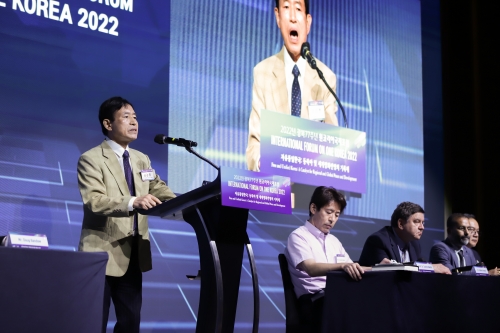
Prof. Kyung-young Chung addresses the International Forum on One Korea.
South Korean Prof. Kyung-young Chung from the Graduate School of International Studies at Hanyang University said, “the defining vision of a unified Korea plays a role in navigating to that ultimate destination.” He said the two Koreas need to take the initiative in creating a cooperative unification environment. “The two Koreas should work together by exploring North-South Korean tasks respectively and identifying joint tasks for building a unified Korea, along with collaboration with neighboring countries and international organizations such as the UN.”
He urged the ROK-U.S. alliance to conclude “an ironclad commitment to the creation of a free and unified Korea. This should provide the focus for the alliance policy and strategy going forward. Every action the alliance undertakes should be made with consideration for how they will affect the goal of achieving unification. . . . It will also develop comprehensive implementation plans for peaceful unification, denuclearization, respect for human rights, and for contingencies that may arise, and which will eventually lead to unification.
“Finally, the two Koreas and U.S.-China should launch strategic talks in order to transform the current instability of the Armistice structure into a peace regime on the Korean peninsula. North Korea and China need to return to Panmunjom for the normalization of the Military Armistice Commission.”
Other speakers examined the political, security, and economic consequences resulting from reunification and pointed to lessons from the reunification of Vietnam and Germany.
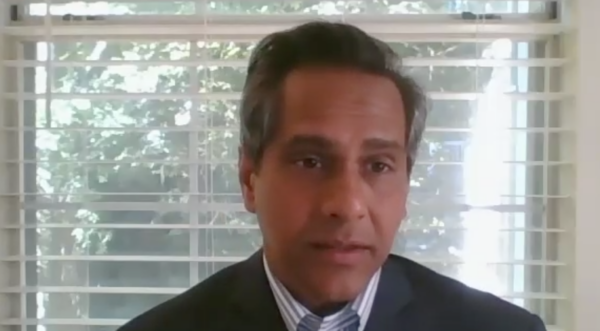
Sourabh Gupta, Resident Senior Fellow at the Institute for China-America Studies, joined scholars from South Korea, the U.S., Australia, and Mongolia at the Economic forum.
In a third virtual webinar, scholars and economists from South Korea, the United States, Australia, and Mongolia examined economic implications of reunification on August 13. The impact of the global pandemic, particularly on North Korea’s closed society, international sanctions against Russian banks and export resources, and growing tension between the U.S. and China all impact economic prospects in Northeast Asia, panelists said.
The costly integration of East Germany into the West German economy also provides a sobering reminder of the impact of Korean reunification, with stark differences in development and social integration in Korea suggesting the process could be more challenging. “There are no economic shortcuts during reunification,” observed Sourabh Gupta, Resident Senior Fellow at the Institute for China-America Studies.
The International Forum on One Korea was convened by the Global Peace Foundation, Action for Korea United, Parliamentarian’s Society of the Republic of Korea, Korean Senior Citizens Association, Korean National Police Veterans Association, Federation of Artistic & Cultural Organization of Korea, One Korea Foundation, and Leaders’ Alliance for Korea Unification. It was sponsored by the ROK Ministry of Unification and Peaceful Unification Advisory Council, and in partnership with Action for Korea United Professors Association, Blue Banner, and Alliance for Korea United.
To learn more about Global Peace Foundation work to advance peaceful reunification, visit One Korea Global Campaign towards a Free and Unified Korea | Global Peace Foundation

